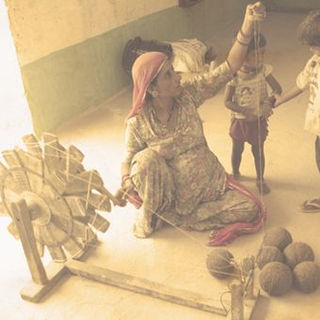

.png)
CHAPTER I . WOVEN TEXTILES
Camel Wool Weaving
By choosing camel milk, wool or paper, we are helping the Raika, keeping the rural community employed,
the camels relevant and the Nature sustainable!
THE RAIKA'S CAMELS
The Raika, a pastoralist and semi-nomadic community of Rajasthan (India), has been herding camels for centuries. The camels represent what many people associates with this colourful state, represent the desert, and they are essential to pastoralists once they can survive the heat, require little water, and offer milk and hair in return.
Traditionally, the Raika communities and farmers are linked economically and socially: when the herder takes his animals on a long trek, he often has to cross farmlands - here, the pastoralists provide the farmer with good fertilizer and fresh milk from the camel, and the farmer provides, in return, with food to the pastoralist. Since the herder’s route seldom changed, an association was formed between the two, which could last generations.
In our days, many farmers don’t allow herders on their lands fearing they will destroy the fields or the camels will eat their crops.
THE RAIKAS' STRUGGLES OF TODAY
Today, the Raikas - who are with their animals from the time they are born until they die, and sometimes grow up surrounded by more animals than people - struggle to survive in the face of often arrogance and hostility towards their migratory traditions.
Back in the days, the Raikas only sold young male camels to earn an income. Now, this is not enough anymore and they have to sell other camel products to supplement their earnings.
Camel milk is rich in nutrients and is considered the next super-food, however its sale in India has not taken off because of numerous restrictions enforced by government dairies. Therefore, the Raika’ ability to sustain themselves is on the decline and, as a consequence, many leave the community looking for alternative livelihoods.
With new restrictive laws making it difficult for camel herders to access land and resources, some Raikas have been forced to sell female camels at the Pushkar festival. They had never done this before the year 2000 – until then, only male camels were sold. The sale of female camels is the ultimate sign of resignation for a Raika: without these animals, there is no chance of increasing the herd.
HELPING THE RAIKA TO SURVIVE
Some non-profit organisations have been helping the Raika communities by creating new products out of camel hair, milk, and even dung - "LPPS / Camel Charisma", based in Sadri (Rajasthan), is one of them.
Camel milk has emerged as a new super-food with miraculous health benefits. It is known to have three times more Vitamin C than cow's milk and is ten times higher in iron content.
Together with these organisations, the Raika collect, sort, grade and spin camel hair with a drop spindle and on a wheel, making a range of splendid camel yarns, by hand.
The yarn comes in a variety of natural colours, like camels do, unaltered in any way and entirely natural.
There is also the paper making: paper made from camel poo, which goes through various processes to be bacteria-free and safe for people.
Camel dung paper has been considered the most bio-diverse paper on earth!
CAMEL WOOL WEAVING
Shop
MANO ETNA RECOMMENDS
"LPPS, Chamel Charisma and the Raika Community"
Video by LPPS/Camel Charisma & What took you so long?
GOOD TO KNOW
Mano Etna products

100%
handmade
sustainable materials
preferred

















